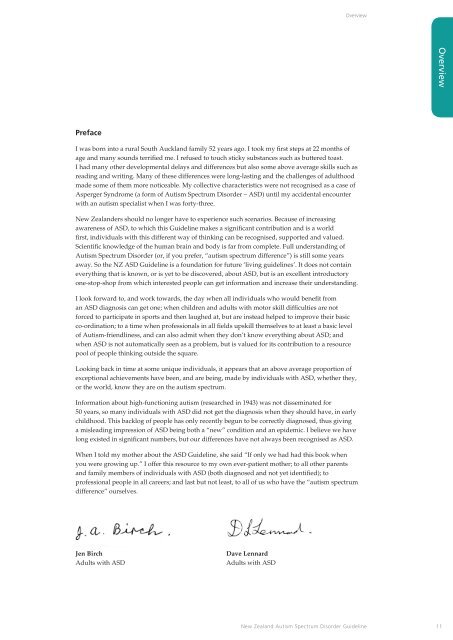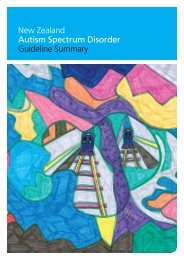New Zealand Autism Spectrum Disorder Guideline - Ministry of Health
New Zealand Autism Spectrum Disorder Guideline - Ministry of Health
New Zealand Autism Spectrum Disorder Guideline - Ministry of Health
You also want an ePaper? Increase the reach of your titles
YUMPU automatically turns print PDFs into web optimized ePapers that Google loves.
Overview<br />
Overview<br />
Preface<br />
I was born into a rural South Auckland family 52 years ago. I took my first steps at 22 months <strong>of</strong><br />
age and many sounds terrified me. I refused to touch sticky substances such as buttered toast.<br />
I had many other developmental delays and differences but also some above average skills such as<br />
reading and writing. Many <strong>of</strong> these differences were long-lasting and the challenges <strong>of</strong> adulthood<br />
made some <strong>of</strong> them more noticeable. My collective characteristics were not recognised as a case <strong>of</strong><br />
Asperger Syndrome (a form <strong>of</strong> <strong>Autism</strong> <strong>Spectrum</strong> <strong>Disorder</strong> – ASD) until my accidental encounter<br />
with an autism specialist when I was forty-three.<br />
<strong>New</strong> <strong>Zealand</strong>ers should no longer have to experience such scenarios. Because <strong>of</strong> increasing<br />
awareness <strong>of</strong> ASD, to which this <strong>Guideline</strong> makes a significant contribution and is a world<br />
first, individuals with this different way <strong>of</strong> thinking can be recognised, supported and valued.<br />
Scientific knowledge <strong>of</strong> the human brain and body is far from complete. Full understanding <strong>of</strong><br />
<strong>Autism</strong> <strong>Spectrum</strong> <strong>Disorder</strong> (or, if you prefer, “autism spectrum difference”) is still some years<br />
away. So the NZ ASD <strong>Guideline</strong> is a foundation for future ‘living guidelines’. It does not contain<br />
everything that is known, or is yet to be discovered, about ASD, but is an excellent introductory<br />
one‐stop‐shop from which interested people can get information and increase their understanding.<br />
I look forward to, and work towards, the day when all individuals who would benefit from<br />
an ASD diagnosis can get one; when children and adults with motor skill difficulties are not<br />
forced to participate in sports and then laughed at, but are instead helped to improve their basic<br />
co‐ordination; to a time when pr<strong>of</strong>essionals in all fields upskill themselves to at least a basic level<br />
<strong>of</strong> <strong>Autism</strong>-friendliness, and can also admit when they don’t know everything about ASD; and<br />
when ASD is not automatically seen as a problem, but is valued for its contribution to a resource<br />
pool <strong>of</strong> people thinking outside the square.<br />
Looking back in time at some unique individuals, it appears that an above average proportion <strong>of</strong><br />
exceptional achievements have been, and are being, made by individuals with ASD, whether they,<br />
or the world, know they are on the autism spectrum.<br />
Information about high-functioning autism (researched in 1943) was not disseminated for<br />
50 years, so many individuals with ASD did not get the diagnosis when they should have, in early<br />
childhood. This backlog <strong>of</strong> people has only recently begun to be correctly diagnosed, thus giving<br />
a misleading impression <strong>of</strong> ASD being both a “new” condition and an epidemic. I believe we have<br />
long existed in significant numbers, but our differences have not always been recognised as ASD.<br />
When I told my mother about the ASD <strong>Guideline</strong>, she said “If only we had had this book when<br />
you were growing up.” I <strong>of</strong>fer this resource to my own ever-patient mother; to all other parents<br />
and family members <strong>of</strong> individuals with ASD (both diagnosed and not yet identified); to<br />
pr<strong>of</strong>essional people in all careers; and last but not least, to all <strong>of</strong> us who have the “autism spectrum<br />
difference” ourselves.<br />
Jen Birch<br />
Adults with ASD<br />
Dave Lennard<br />
Adults with ASD<br />
<strong>New</strong> <strong>Zealand</strong> <strong>Autism</strong> <strong>Spectrum</strong> <strong>Disorder</strong> <strong>Guideline</strong> 11











